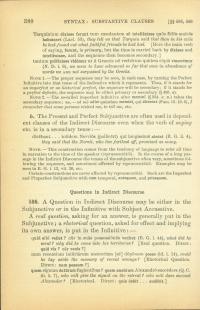586. A Question in Indirect Discourse may be either in the Subjunctive or in the Infinitive with Subject Accusative. A real question, asking for an answer, is generally put in the Subjunctive; a rhetorical question, asked for effect and implying its own answer, is put in the Infinitive.
quid sibi vellet? cūr in suās possessiōnēs venīret (B. G. 1.44) What did he want? Why did he come into his territories? [Real question. Direct: Quid vīs? Cūr venīs?]
num recentium iniūriārum memoriam [sē] dēpōnere posse (id. 1.14) Could he lay aside the memory of recent wrongs? [Rhetorical Question. Direct: num possum?]
quem sīgnum datūrum fugientibus? quem ausūrum Alexandrō succēdere (Q. C. 3.5.7) Who will give the signal on the retreat? Who will dare succeed Alexander? [Rhetorical. Direct: quis dabit . . . audēbit?]
Note 1— No sharp line can be drawn between the Subjunctive and the Infinitive in questions in the Indirect Discourse. Whether the question is to be regarded as rhetorical or real often depends merely on the writer's point of view.
utrum partem rēgnī petītūrum esse, an tōtum ēreptūrum (Liv. 45.19.15) Will you ask part of the regal power (he said), or seize the whole?
quid tandem praetōrī faciendum fuisse (id. 31.48) What, pray, ought a prætor to have done?
quid repente factum[esse] cūr, etc. (id. 34.54) What had suddenly happened, that, etc.?
Note 2— Questions coming immediately after a verb of asking are treated as Indirect Questions and take the Subjunctive (see § 574). This is true even when the verb of asking serves also to introduce a passage in the Indirect Discourse. The question may be either real or rhetorical. See quaesīvit, etc. (Liv. 37.15). For the use of tenses, see § 585.
587. A Deliberative Subjunctive (§ 444) in the Direct Discourse is always retained in the Indirect.
cūr aliquōs ex suīs āmitteret? (B. C. 1.72) Why (thought he) should he lose some of his men? [Direct: Cūr āmittam?]


